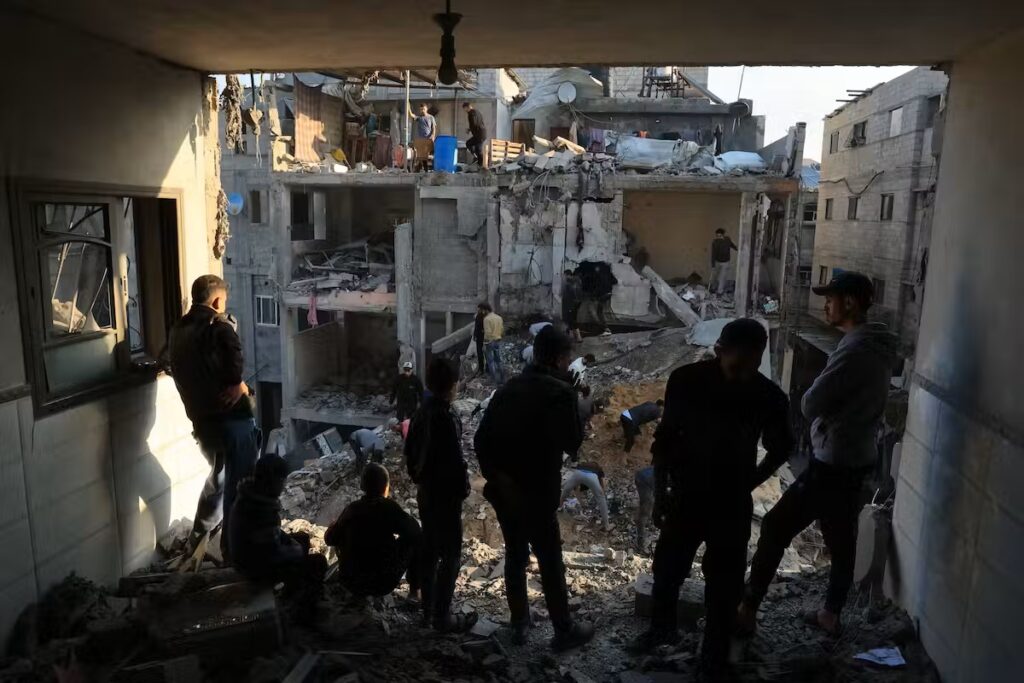Pilgrim’s Progress: Keeping Workers Safe In The Holy Land
May 6, 2024 | Pratirodh Bureau
Every year, thousands of Malayalees from Kerala migrate to the Gulf countries in search of jobs or to take up various types of employment there. Many remain in the UAE, Kuwait, Bahrain, Saudi Arabia, Qatar and Oman for years, earning sufficient money before returning home to relative prosperity (Image: Said Khatib/AFP via Getty Images)
The Church of the Holy Sepulchre, Christianity’s holiest shrine in the world, is an unlikely place to lose yourself in Israel. Or so you might think. Not so Kerala’s Christian tourists to this shrine.
In February 2023, when a Kerala farmer, who was said to be on an official delegation to Israel, went missing from his group, there was uproar in the media back home. A Kerala priest who led pilgrimage tours from Thiruvananthapuram later revealed that six people from that group, which included several elderly women, had made themselves scarce.
Every year, thousands of Malayalees from Kerala migrate to the Gulf countries in search of jobs or to take up various types of employment there.
Many remain in the UAE, Kuwait, Bahrain, Saudi Arabia, Qatar and Oman for years, earning sufficient money before returning home to relative prosperity. The outmigration adventure, which began in the 1960s in dhows or country boats, has also been captured in popular cinema.
Alongside this routine labour migration of both skilled and semi-skilled workers to the Gulf – often deemed a success story – Kerala has also been a source of surreptitious illegal outmigration to not only the Gulf states but more recently to Israel, where conflict is a perennial danger.
Reports indicate that gangs working out of some Kerala towns are “actively involved in trafficking humans to Israel”.
The May 2023 Israel-India framework agreement and implementation protocol on labour movement, though fraught with risks for prospective migrants, could be a game-changer.
This agreement states that Indian labour migrants seeking work in Israel’s construction, agriculture and homecare sectors “shall enjoy equal treatment with respect to labour rights as Israeli citizens and shall be provided with proper lodging, medical insurance and relevant social security coverage”.
After the first batch of 65 workers left for Israel in April 2024, the flare up of Iran-Israel hostilities forced Indian authorities to suspend further movement. But this was more in response to the emergent situation and not for workers’ safety.
This assumes greater significance especially in the absence of any robust legislations that govern international labour migration processes.
It also raises other questions. The big one being: is the India-Israel agreement a one-time shift in the dominant culture of policy mechanisms, given that the timing of the workers’ movement coincided with desperate labour shortage threatening the Israeli economy?
With war between Iran and Israel a threat, the protection of Indian workers’ lives is a major issue.
Activist groups in Kerala have expressed dissatisfaction with the Indian government’s non-transparent practices involved in labour migration to Israel.
Some Kerala researchers and migration experts say the details of agreements and memoranda of understanding must be made available to specialised organisations for critical examination and review. Public scrutiny of such documents would usher in transparency and efficiency in labour migration processes.
While care workers enjoy the relative advantage of being provided with protection mechanisms in Israel, there is widespread apprehension that agriculture and construction workers may face serious challenges in the event of armed conflict.
The experiences of expatriate workers during the 1990-91 Kuwait war, Indian labour ordeals during the Iraq war and the Yemen crisis are important reference points.
The extreme conditions during the COVID-19 pandemic across the Middle East present a different but comparable set of hardships faced by migrant workers.
The death of Nibin Maxwell, a 31-year old Malayali expatriate following a Hamas attack on Israel on March 4 2024, has aggravated concerns on safety.
Safe and orderly migration during armed conflict usually fails since usual consular and inter-governmental mechanisms and civil society networks are disrupted.
Bonded labour-like conditions and forced work during the Iraq war – Indians were released or escaped from illegal custody – is a case in point. Besides such situations, there are matters of expenses, such as the huge public-funded evacuation initiatives during the Kuwait crisis.
Life-threatening situations existed during the Kuwait crisis and later during the Iraq war. Both times, the ability of nation states to rescue their citizens from these conflict areas did not work uniformly.
Today, there is a possible threat of attacks on civilian areas. But with Iran’s attack on Israel and the latter’s military response, there is a real danger of destructive war in the near future.
Indian workers enjoy wage and other benefits, including civic freedom, in Israel which, as an OECD member state, has robust social security and wage-related regulations.
However, there are concerns related to transparency in terms of guarantees for protection of life and whether those who facilitate migration will bear responsibility for ensuring the right to life of migrants.
Migrant experiences from a few South Asian countries to Israel reveal the shady roles played by agents and the demand for some form of government mechanism.
A contract is the basis of labour migration to Israel, which could be made the norm for all future demand and supply-side arrangements in the region.
A full and fair investigation of recent labour recruitment processes for Israel would ensure safe, orderly and regular migration as argued in international instruments such as the Global Compact on Migration, to which India is also a signatory.
(Originally published under Creative Commons by 360info™. Read the original article here)
